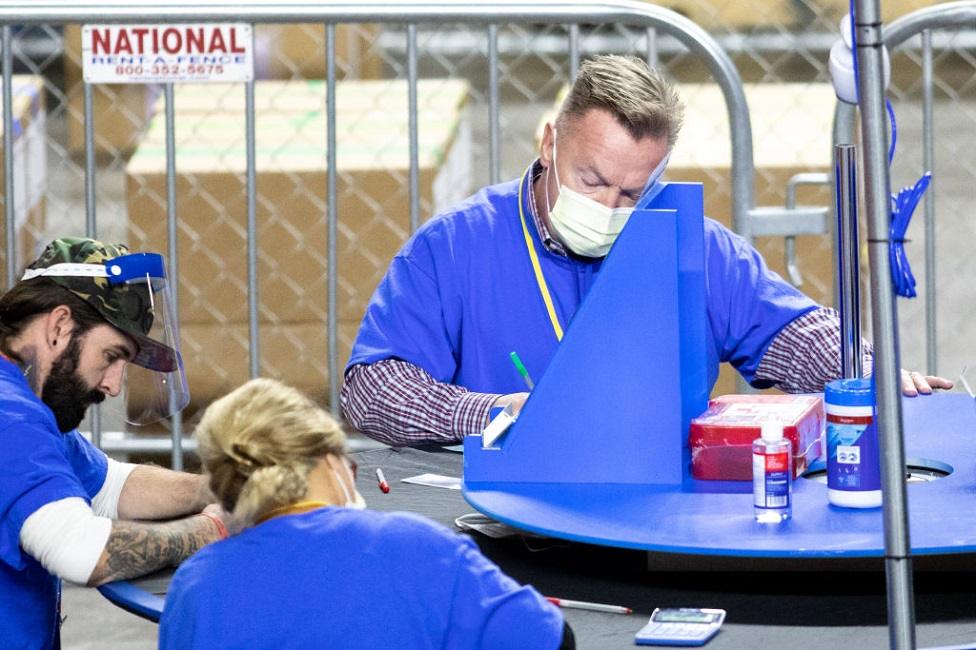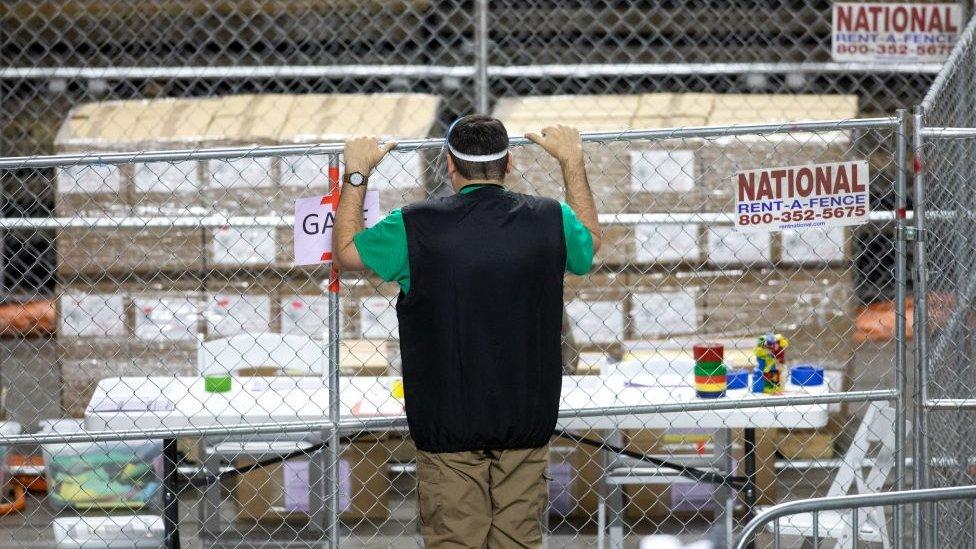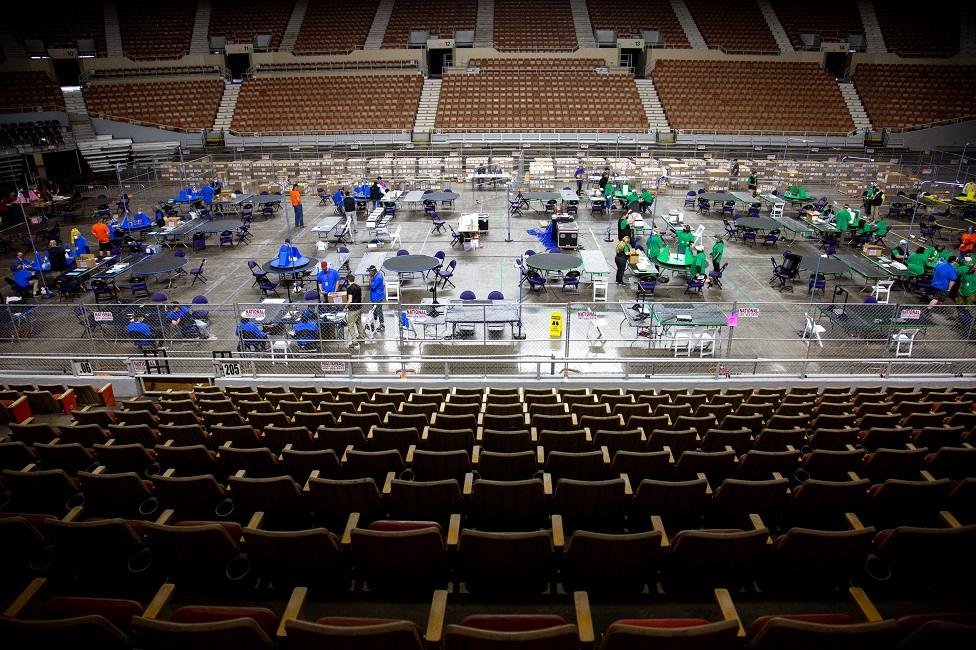Arizona recount: Why Republicans are still tallying votes
- Published

It's been seven months since the 2020 US presidential election. Donald Trump may not have conceded, but he's out of office.
Joe Biden has been president for more than 100 days. The drumbeat of policy-making has moved on to pandemic relief and infrastructure spending.
And yet in Mar-a-Lago, Trump is still complaining about his election loss. In Washington, Republicans just booted Liz Cheney, who said Biden was legitimately elected, from her congressional leadership post.
And in Phoenix, Arizona, they're still counting - or technically, auditing - ballots.
What is the audit?
The audit is a review of more than two million ballots cast in Maricopa County - which includes Phoenix - ordered by the Republican majority that controls Arizona's state Senate.
Joe Biden carried Maricopa County by more than 45,000 votes on the way to winning Arizona by 10,457 votes. He was the first Democrat to take the state since Bill Clinton in 1992.
Republican audit backers theorise that if they can find substantive evidence of fraud then it means Trump really won Arizona. If Trump really won Arizona, maybe he really won other states he narrowly lost. And if he really won enough other states, then he really won the election.
All this requires extreme logical contortions, but it's what they're rolling with.
It's also worth noting that the Republican-controlled Maricopa County Board of Supervisors, which ran the county's election process and reviewed its results, stands behind their original tally and has had no interest in participating in the process.
So who is doing it?
Here's where it gets interesting - and weird.
The Arizona Senate is paying $150,000 for the audit to be conducted by a private Florida-based company, Cyber Ninjas, that has never done anything like this before and isn't certified by the federal government to test voting systems.
The process by which the Senate chose the company is opaque, and extra costs are being covered by right-wing fundraising.
Already, Cyber Ninjas - which is paying individuals $15 an hour to conduct the audit - has made some basic mistakes, such as allowing blue pens to be used on the ballots. Blue ink is used to vote so this could potentially alter voters' intentions.
The company also has been accused of leaving ballots and computers unsecured.

Trump supporters outside the recount
Cyber Ninjas owner Doug Logan is a Trump supporter who advanced conspiracy theories about 2020 election fraud last year.
Media access to the review has been limited, but one reporter spotted a former Arizona Republican officeholder, Anthony Kern, among those participating in the ballot-counting.
Kern attended the 6 January pro-Trump rally in Washington and was seen outside the US Capitol while some Trump supporters ransacked the building later in the day.
What are the auditors looking for?
Unspecified evidence of fraud in the state's presidential and senate races (both of which, it so happens, Democrats won).
They're tabulating the ballots - something that was done after the election and then again during a routine partial recount that all Arizona counties are legally required to perform (and which, in Maricopa, fully corroborated the initial results).
They're also looking for somewhat more, shall we say, unusual evidence of malfeasance. They've been holding ballots up to ultraviolet light, photographing them with high-resolution cameras, analysing folding patterns on the paper as well as its thickness and colour, and looking for traces of bamboo fibre.
Wait a minute, Bamboo fibre?
Yes. According to one volunteer, John Brakey, they're investigating whether fake ballots may have been snuck in from overseas.
"They use bamboo in their paper processing, people in southeast Asia," he told a local CBS television station.
Brakey is quick to say he doubts such fraud is real, but the investigators apparently want to leave no stone unturned, untested and unsubjected to ultraviolet light.
As mail-in Arizona ballots are matched against registered voters, multiple votes cast by the same individual would have been flagged.
How is any of this legal?
The Arizona audit was authorised by the Arizona Senate, which issued a subpoena for the ballots under its investigatory powers.
This isn't a legally binding recount that could reverse the 2020 result, so the courts have given the auditors more leeway in how they conduct their operations.
A court did prevent the auditors from attempting to match the signatures on mail-in ballots with voter files out of concern over infringing on voter privacy, however.

A Cyber Ninjas contractor looks at the ballots
Cyber Ninja contractors also abandoned plans to contact voters in-person to verify their ballots after the US Justice Department threatened to sue over concerns of voter intimidation.
What does Donald Trump think about all this?
He loves it, of course. He's been cheering the auditors in press releases.
"I wouldn't be surprised if they found thousands and thousands and thousands of votes," he told a group of guests two weeks ago , externalat his Mar-a-Lago club. "This was a rigged election, everybody knows it, and we're going to be watching it very closely."
Trump has also been demanding that the state's Republican governor, Doug Ducey, provide "large-scale security", such as the police or national guard, for the auditors.
Security? Is this dangerous?
Probably not.
According to documents released under court order, however, Cyber Ninjas prepared for sinister antifa agents to disrupt their efforts.
For instance, they worried that a nearby chemical storage area could be sabotaged by leftists as part of an orchestrated attempt to breach the counting area.
This hasn't happened.
What do other Republican politicians think?
The ones who want to stay in Trump's good graces are welcoming the audit.
"We want transparency and answers for the American people," Congresswoman Elise Stefanik, who is poised to replace Cheney in the Republican leadership, said last week. "What are the Democrats so afraid of?"
Given that polls show a majority of Republicans , externalthink Democrats stole the election, members of the party who are in favour of the audit are on solid political ground.
Some Republicans, including in Arizona, may be having doubts, however.
"It makes us look like idiots," Phoenix-area state senator Paul Boyer told the New York Times, external. "Looking back, I didn't think it would be this ridiculous."
And what do Democrats think?
To put it bluntly, Democrats view the audit as a political stunt, a waste of money and a sham that will only inflame conspiracy theories and further undermine American confidence in the electoral process.

A former professional basketball arena is where the count is taking place
They sued to block the audit from going forward, and a state judge tentatively agreed - but required Democrats to pay $1m to cover additional costs a delay during the legal review might incur. Democrats decided they could find better uses for that money.
The judge did require Cyber Ninjas to turn over copies of its procedures and training manuals - a move the company initially resisted, asserting that it needed to protect its "trade secrets".
So, if none of this counts, what's the point?
According to those conducting the recount, the purpose of this project is to address a prevailing concern among some voters that the 2020 election was illegitimate. And if the final result is that there was no fraud? That's fine, too.
"This is not about calling into question the results of the November election," Ken Bennett, spokesman for the audit, told the Washington Post. "This is about identifying if there are any areas of our elections that need to be improved going forward."
Few Democrats believe this, of course. They fear that the point of the audit is to simply sow further doubt about Biden's victory - and pave the way for Republican state-level efforts to enact new voting restrictions that disadvantage their candidates and voters in the name of "ballot security".
The audit was supposed to wrap up at the end of this week, but only about 10% of the ballots have been counted so far. The tally will now be suspended while numerous high-schools use the arena for graduation ceremonies.
Organisers say it could be completed in July.
Meanwhile in Virginia, the results for the Republican nomination for governor took days longer than expected because several candidates expressed concerns about ballot security and the impartiality of party vote-counters.
The Arizona audit may be less a cause of growing distrust in elections than a harbinger of what's to come in American democracy, where every election is viewed with suspicion and every result subject to seemingly endless challenges.
Related topics
- Published3 June 2019

- Published1 March 2021
- Published18 March 2021
- Published13 July 2021
- Published28 January 2021
